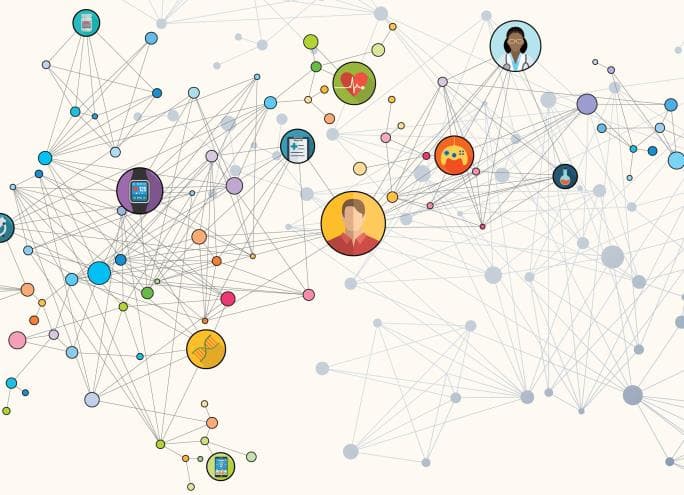Data-driven medicine

Almost imperceptibly, advances in data and computation have changed our daily lives. To find the fastest route to work, you use an app that gathers live traffic data from thousands of users. A wristband keeps track of how far you've walked, and a diet app tells you whether you've earned those extra calories of dessert. And to wind down the day, another service recommends a show you'll probably like and streams it to your television.
Behind the scenes of these now-routine applications are highly advanced developments in cloud computing, machine learning, data mining and computer simulation. Parallel to the tech industry, physicians and researchers at the University of Chicago are working to apply these same innovations in the hospital and the laboratory to improve patient care and our knowledge of health and biology.
Already, many of the same technologies that power online shopping, fitness tracking, video games and self-driving cars are changing the practice of medicine. Scientists are exploring the potential of these tools to generate new strategies for treating cancer and sepsis as well as preventing cardiac arrest and disease outbreaks. New ways of working with data promise to bring us closer to the vision of precision medicine and to solutions for some of the oldest and most difficult medical challenges.

"It is such an exciting and amazing time to be working in medical data science," said Samuel Volchenboum, MD, PhD, MS, associate professor of pediatrics and director of the Center for Research Informatics (CRI). "The deluge of data and torrents of information from all corners of medicine and health care are overwhelming traditional analysis pipelines and storage and transfer mechanisms. By bringing together data scientists, clinician investigators and engineers, we are in an incredible and unique position to solve some of the most difficult problems facing health care."
Recommended for you
By now, most of us are used to the uncannily accurate recommendations served up by online stores and streaming services. To generate these personalized picks, algorithms combine your browsing, listening and viewing history with those of similar users, looking for things others enjoyed that you have yet to try. By putting your taste and purchases in the context of a broader population of people, the process known as "machine learning" makes better predictions about what you'd like.
While the stakes are much higher, the concept behind personalized medicine follows a similar principle - combining a patient's information with results from similar cases to find the likely best treatment. The approach has particular relevance for cancers, which can be triggered by a multitude of genetic mutations, some of which have proven, targeted therapies. But the enormous number of factors involved in the initiation and progression of cancer, combined with incomplete data on the efficacy of treatments, raises the computational bar.
Recognizing the potential and challenges of this task, the UChicago Medicine Department of Pathology formed the Division of Genomic and Molecular Pathology in 2013. Pathologists are at the center of the quest for personalized medicine, as they collect the critical information about patient tumors used in later decision-making. But as known mutations and test panels rapidly multiply, this initial step becomes more complex and data-heavy.
Working with the Center for Research Informatics' bioinformatics group, the molecular pathology core developed SIMPL (System for Informatics in the Molecular Pathology Laboratory), an automated pipeline for handling the more than 100 steps that each tumor sample passes through while it is screened for cancer-causing gene mutations. What was once a cluttered spreadsheet is now a sleek dashboard, tracking the sample through the different genetic tests and assays, then generating a report that can suggest or rule out specific treatments for the patient.
"The ultimate goal is to support personalized medicine initiatives," said Jeremy Segal, MD, PhD, assistant professor of pathology. "Because each patient and each cancer is different, we need to figure out, based on the genetics of each person's cancer, how we might treat them and what information we might be able to give them."
The SIMPL interface can also be adapted to coordinate complex multi-hospital collaborations, particularly around rare childhood cancers that lack sufficient data to discover new therapies. One such effort, the Genomic Assessment Improves Novel Therapy (GAIN) Consortium, led by Dana-Farber Cancer Institute, will use SIMPL to coordinate sample collection, genetic analysis, and knowledge generation/ aggregation for pediatric solid tumors and blood cancers at more than 20 medical centers.
"The GAIN platform facilitates and automates the query of several databases for information and annotations on genomic variants and then makes it easy for pediatric molecular pathologists to analyze and report on the significant findings," Volchenboum said. "This ultimately allows the physician to make an informed decision about treatment. It really is changing the way in which this type of important clinical work is done."
This is the first of a five-part series on data-driven medicine and research at the University of Chicago Medicine, originally published in the Spring 2017 issue of Medicine on the Midway.

